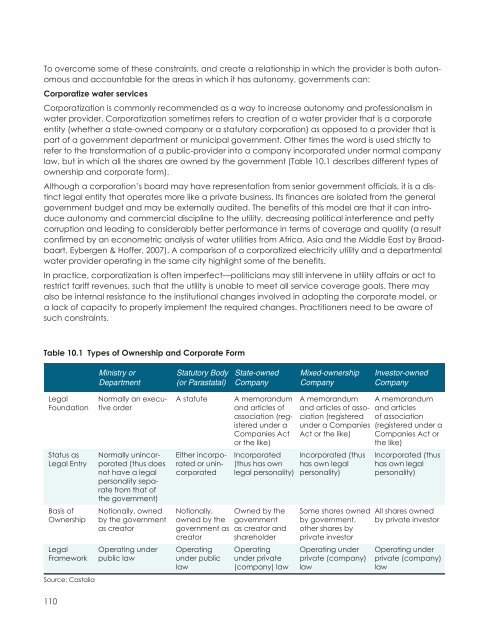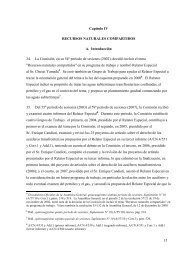A Sourcebook - UN-Water
A Sourcebook - UN-Water
A Sourcebook - UN-Water
You also want an ePaper? Increase the reach of your titles
YUMPU automatically turns print PDFs into web optimized ePapers that Google loves.
To overcome some of these constraints, and create a relationship in which the provider is both autonomous<br />
and accountable for the areas in which it has autonomy, governments can:<br />
Corporatize water services<br />
Corporatization is commonly recommended as a way to increase autonomy and professionalism in<br />
water provider. Corporatization sometimes refers to creation of a water provider that is a corporate<br />
entity (whether a state-owned company or a statutory corporation) as opposed to a provider that is<br />
part of a government department or municipal government. Other times the word is used strictly to<br />
refer to the transformation of a public-provider into a company incorporated under normal company<br />
law, but in which all the shares are owned by the government (Table 10.1 describes different types of<br />
ownership and corporate form).<br />
Although a corporation’s board may have representation from senior government officials, it is a distinct<br />
legal entity that operates more like a private business. Its finances are isolated from the general<br />
government budget and may be externally audited. The benefits of this model are that it can introduce<br />
autonomy and commercial discipline to the utility, decreasing political interference and petty<br />
corruption and leading to considerably better performance in terms of coverage and quality (a result<br />
confirmed by an econometric analysis of water utilities from Africa, Asia and the Middle East by Braadbaart,<br />
Eybergen & Hoffer, 2007). A comparison of a corporatized electricity utility and a departmental<br />
water provider operating in the same city highlight some of the benefits.<br />
In practice, corporatization is often imperfect—politicians may still intervene in utility affairs or act to<br />
restrict tariff revenues, such that the utility is unable to meet all service coverage goals. There may<br />
also be internal resistance to the institutional changes involved in adopting the corporate model, or<br />
a lack of capacity to properly implement the required changes. Practitioners need to be aware of<br />
such constraints.<br />
Table 10.1 Types of Ownership and Corporate Form<br />
Ministry or Statutory Body State-owned Mixed-ownership Investor-owned<br />
Department (or Parastatal) Company Company Company<br />
Legal<br />
Foundation<br />
Status as<br />
Legal Entry<br />
Basis of<br />
Ownership<br />
Legal<br />
Framework<br />
Source: Castalia<br />
Normally an executive<br />
order<br />
Normally unincorporated<br />
(thus does<br />
not have a legal<br />
personality separate<br />
from that of<br />
the government)<br />
Notionally, owned<br />
by the government<br />
as creator<br />
Operating under<br />
public law<br />
A statute<br />
Either incorporated<br />
or unincorporated<br />
Notionally,<br />
owned by the<br />
government as<br />
creator<br />
Operating<br />
under public<br />
law<br />
A memorandum<br />
and articles of<br />
association (registered<br />
under a<br />
Companies Act<br />
or the like)<br />
Incorporated<br />
(thus has own<br />
legal personality)<br />
Owned by the<br />
government<br />
as creator and<br />
shareholder<br />
Operating<br />
under private<br />
(company) law<br />
A memorandum<br />
and articles of association<br />
(registered<br />
under a Companies<br />
Act or the like)<br />
Incorporated (thus<br />
has own legal<br />
personality)<br />
Some shares owned<br />
by government,<br />
other shares by<br />
private investor<br />
Operating under<br />
private (company)<br />
law<br />
A memorandum<br />
and articles<br />
of association<br />
(registered under a<br />
Companies Act or<br />
the like)<br />
Incorporated (thus<br />
has own legal<br />
personality)<br />
All shares owned<br />
by private investor<br />
Operating under<br />
private (company)<br />
law<br />
110
















